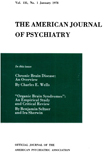Human Violence as Viewed from the Psychiatric Clinic
Abstract
Validation for ethological theories about the origins of human violence and aggression may be sought in certain well-studied forms of behavior. Observations in relation to crime and other forms of violent conduct have given unequivocal answers to the questions posed; factors in the familial and social environment prove to account for most of the variation observed. Such "frustrative-impulsive" forms of aggression are associated with many indices of personality damage. The forms of behavior exemplified by political, religious, and revolutionary wars are termed "altruistic." They have expended lives in vast numbers but would not have been possible without the peculiarly human characteristic of self-sacrifice. Psychiatry has an important task in more precisely defining and depicting these phenomena and in studying their underlying causes.
Access content
To read the fulltext, please use one of the options below to sign in or purchase access.- Personal login
- Institutional Login
- Sign in via OpenAthens
- Register for access
-
Please login/register if you wish to pair your device and check access availability.
Not a subscriber?
PsychiatryOnline subscription options offer access to the DSM-5 library, books, journals, CME, and patient resources. This all-in-one virtual library provides psychiatrists and mental health professionals with key resources for diagnosis, treatment, research, and professional development.
Need more help? PsychiatryOnline Customer Service may be reached by emailing [email protected] or by calling 800-368-5777 (in the U.S.) or 703-907-7322 (outside the U.S.).



